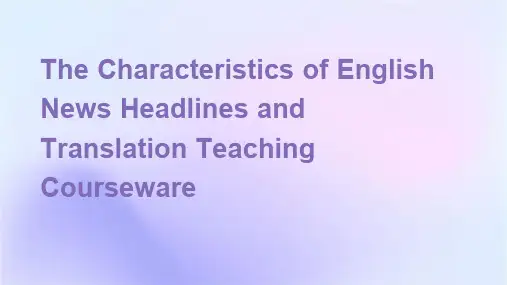英语报刊新闻标题专讲共49页
- 格式:ppt
- 大小:2.85 MB
- 文档页数:49

![[英美报刊] 英文新闻标题](https://uimg.taocdn.com/205c2f8783d049649b665855.webp)
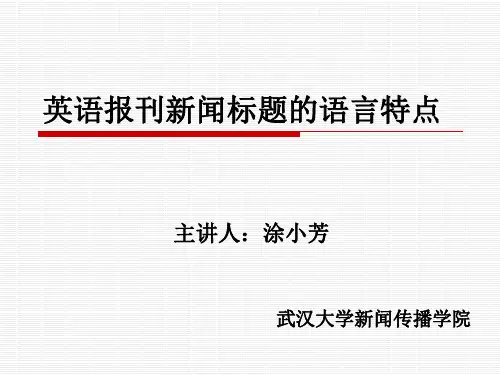
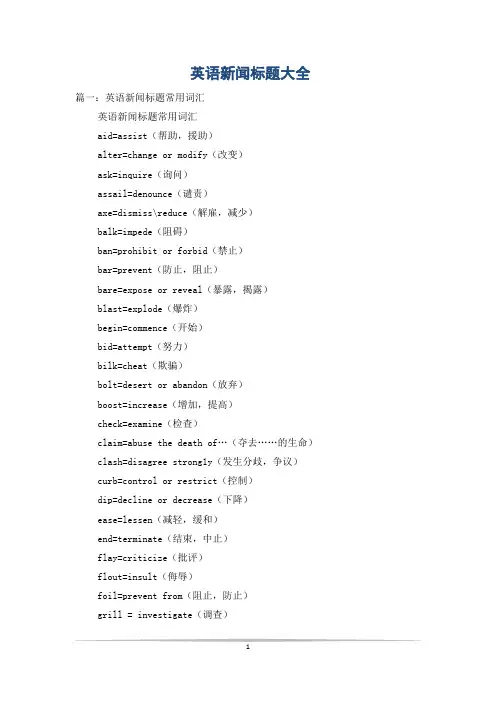
英语新闻标题大全篇一:英语新闻标题常用词汇英语新闻标题常用词汇aid=assist(帮助,援助)alter=change or modify(改变)ask=inquire(询问)assail=denounce(谴责)axe=dismiss\reduce(解雇,减少)balk=impede(阻碍)ban=prohibit or forbid(禁止)bar=prevent(防止,阻止)bare=expose or reveal(暴露,揭露)blast=explode(爆炸)begin=commence(开始)bid=attempt(努力)bilk=cheat(欺骗)bolt=desert or abandon(放弃)boost=increase(增加,提高)check=examine(检查)claim=abuse the death of…(夺去……的生命) clash=disagree strong1y(发生分歧,争议)curb=control or restrict(控制)dip=decline or decrease(下降)ease=lessen(减轻,缓和)end=terminate(结束,中止)flay=criticize(批评)flout=insult(侮辱)foil=prevent from(阻止,防止)grill = investigate(调查)gut=destroy(摧毁)head=direct(率领)hold=arrest(逮捕)laud=praise(赞扬)lop=diminish(下降,减少)map=work out(制订)mark=celebrate(庆祝)name=appoint\nominate(命名,提名) moot=discuss(讨论)mull=consider(考虑)nab=arrest(逮捕)nip=defeat(击败)nix=deny\disapprove(否决,拒绝)opt=choose(选择)oust=expel(驱逐)peril=endanger(危害,危及)pledge=determine(发誓)plot=conspire(预谋,密谋策划)plunge=plummet(价格等)暴跌poise=ready for action(作好准备) probe=investigate(调查)raid =attack(进攻)rap =criticize(批评)rebuke=criticize(批评)rout=defeat completely(击溃,打垮) slay=murder(谋杀)soar=skyrocket(急剧上升)spur=encourage(激励,鞭策)swap=exchange(交流,交换)sway=influence(影响)trim=reduce(削减)vie=compete(竞争)vow=determine(决心,发誓)weigh=consider(考虑)woo=seek to win(争取,追求)常见诸报端的标题小词,以备不时之需:ace=champion(得胜者)aid=assistance(帮助)blast=explosion(爆炸)body=committee,commission (委员会)clash=controversy(机构)crash=collision(碰撞,坠毁)deal=agreement,transaction (协议,交易)dems=democrats(民主主义者,民主人士,民主党党员)envoy=ambassador(大使)fake=counterfeit(赝品,骗局)fete=celebration(庆祝)feud=strong dispute(严重分歧)flop=failure(失败)freeze=stabilization (冻结,平抑)glut=oversupply(供过于求)GOP=Grand 0ld Party(〈美国〉共和党)nod=approval(许可,批准)pact=agreement,treaty (条约,协议)poll=election,public opinion poll (投票选举,民意测验) probe=investigation(调查)pullout=withdrawal(撤退,撤离)rift=separation(隔离,分离)row=quarrel(争论,争议)set=ready(准备)snag=unexpected difficulty (意外障碍,意外困难)statement=dispute that cannot be settled(僵持,僵局) stance=attitude(态度)step=progress(进程,进步)strife=conflict(冲突,矛盾)ties=(diplomatic)relations (关系)一些常见诸英语报端的这类节缩词,供读者读报时对照、查考: Aussie=Australian(澳大利亚的)biz=business(商业)champ=champion(冠军)con=convict(罪犯)deli=delicatessen(熟食)expo=exposition(博览会)homo=homosexual(同性恋)lib=liberation(解放)pro=professional(专业的,职业的)rep=representative(代表)Russ=Russia(俄罗斯)Sec=secretary(秘书)chute=parachute(降落伞)copter=helicopter(直升机)nat’l=national(全国的)com’l=commercial(商业的,广告)c’tee=committee(委员会)C’wealth=Commonwealth(英联邦)telly=television(电视机)tech=technology(技术)pix=pictures(电影)vet=veteran(老兵,老手)vic=victory(胜利英语新闻标题中经常出现的缩写词主要分为三类:1、组织机构等专有名称,如上述例句中的CPPCC (全国政协)和PLO(巴解组织)。

英语新闻标题大全篇一:英语新闻标题常用词汇英语新闻标题常用词汇aid=assist(帮助,援助)alter=change or modify(改变)ask=inquire(询问)assail=denounce(谴责)axe=dismiss\reduce(解雇,减少)balk=impede(阻碍)ban=prohibit or forbid(禁止)bar=prevent(防止,阻止)bare=expose or reveal(暴露,揭露)blast=explode(爆炸)begin=commence(开始)bid=attempt(努力)bilk=cheat(欺骗)bolt=desert or abandon(放弃)boost=increase(增加,提高)check=examine(检查)claim=abuse the death of…(夺去……的生命) clash=disagree strong1y(发生分歧,争议)curb=control or restrict(控制)dip=decline or decrease(下降)ease=lessen(减轻,缓和)end=terminate(结束,中止)flay=criticize(批评)flout=insult(侮辱)foil=prevent from(阻止,防止)grill = investigate(调查)gut=destroy(摧毁)head=direct(率领)hold=arrest(逮捕)laud=praise(赞扬)lop=diminish(下降,减少)map=work out(制订)mark=celebrate(庆祝)name=appoint\nominate(命名,提名) moot=discuss(讨论)mull=consider(考虑)nab=arrest(逮捕)nip=defeat(击败)nix=deny\disapprove(否决,拒绝)opt=choose(选择)oust=expel(驱逐)peril=endanger(危害,危及)pledge=determine(发誓)plot=conspire(预谋,密谋策划)plunge=plummet(价格等)暴跌poise=ready for action(作好准备) probe=investigate(调查)raid =attack(进攻)rap =criticize(批评)rebuke=criticize(批评)rout=defeat completely(击溃,打垮) slay=murder(谋杀)soar=skyrocket(急剧上升)spur=encourage(激励,鞭策)swap=exchange(交流,交换)sway=influence(影响)trim=reduce(削减)vie=compete(竞争)vow=determine(决心,发誓)weigh=consider(考虑)woo=seek to win(争取,追求)常见诸报端的标题小词,以备不时之需:ace=champion(得胜者)aid=assistance(帮助)blast=explosion(爆炸)body=committee,commission (委员会)clash=controversy(机构)crash=collision(碰撞,坠毁)deal=agreement,transaction (协议,交易)dems=democrats(民主主义者,民主人士,民主党党员)envoy=ambassador(大使)fake=counterfeit(赝品,骗局)fete=celebration(庆祝)feud=strong dispute(严重分歧)flop=failure(失败)freeze=stabilization (冻结,平抑)glut=oversupply(供过于求)GOP=Grand 0ld Party(〈美国〉共和党)nod=approval(许可,批准)pact=agreement,treaty (条约,协议)poll=election,public opinion poll (投票选举,民意测验) probe=investigation(调查)pullout=withdrawal(撤退,撤离)rift=separation(隔离,分离)row=quarrel(争论,争议)set=ready(准备)snag=unexpected difficulty (意外障碍,意外困难)statement=dispute that cannot be settled(僵持,僵局) stance=attitude(态度)step=progress(进程,进步)strife=conflict(冲突,矛盾)ties=(diplomatic)relations (关系)一些常见诸英语报端的这类节缩词,供读者读报时对照、查考: Aussie=Australian(澳大利亚的)biz=business(商业)champ=champion(冠军)con=convict(罪犯)deli=delicatessen(熟食)expo=exposition(博览会)homo=homosexual(同性恋)lib=liberation(解放)pro=professional(专业的,职业的)rep=representative(代表)Russ=Russia(俄罗斯)Sec=secretary(秘书)chute=parachute(降落伞)copter=helicopter(直升机)nat’l=national(全国的)com’l=commercial(商业的,广告)c’tee=committee(委员会)C’wealth=Commonwealth(英联邦)telly=television(电视机)tech=technology(技术)pix=pictures(电影)vet=veteran(老兵,老手)vic=victory(胜利英语新闻标题中经常出现的缩写词主要分为三类:1、组织机构等专有名称,如上述例句中的CPPCC (全国政协)和PLO(巴解组织)。
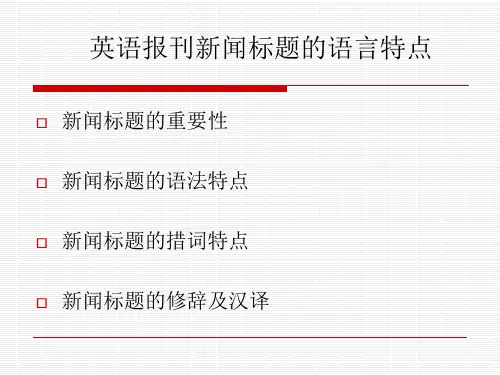
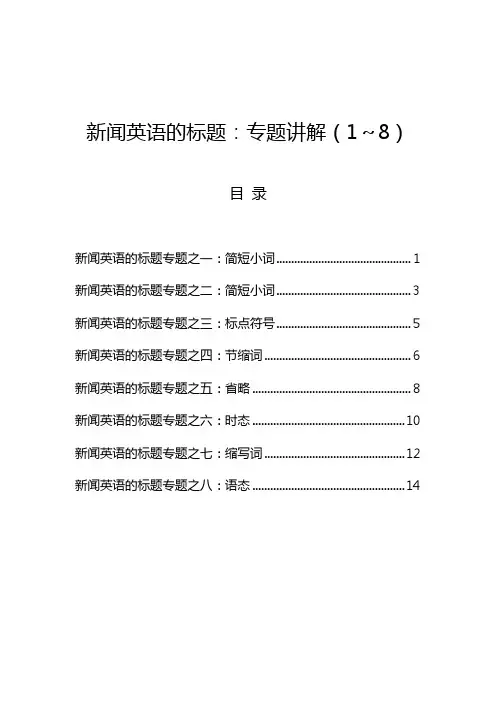
新闻英语的标题:专题讲解(1~8)目 录新闻英语的标题专题之一:简短小词 (1)新闻英语的标题专题之二:简短小词 (3)新闻英语的标题专题之三:标点符号 (5)新闻英语的标题专题之四:节缩词 (6)新闻英语的标题专题之五:省略 (8)新闻英语的标题专题之六:时态 (10)新闻英语的标题专题之七:缩写词 (12)新闻英语的标题专题之八:语态 (14)新闻英语的标题专题之一:简短小词英语新闻标题总是力求用有限的字数来表达新闻的内容,为此,在措词上尤其要狠下功夫,选词尽可能经济达意、简短明了,偏爱选用那些短小精悍或字母最少的动词。
这是因为短小易懂、形象生动的措词不仅能增强新闻的简洁性和可读性,而且还能节省版面篇幅。
如表示“破坏”或“损坏”一词意义的动词,标题一般不用damage,而用一些较之简短的词,如hit,harm,hurt, ruin或wreck等。
又如表示“放弃”这一概念的动词,标题一般不用abandon,而用drop,give up,quit,skip或yield 等,表示“爆炸”之类的动词意义时,一般不用 explode,而用blast,crash, ram或smash等词。
简而言之,英语新闻标题大都喜欢选用字形短小、音节不多而意义又比较广泛的词。
这类动词在标题中屡见不鲜,读者平时阅读时不妨多加留意,这对于提高英语水平,尤其是熟悉英语同义动词,无疑是大有稗益的。
为便于读者更好地理解英语新闻标题,现再列举一些常见诸报端的标题小词,以备不时之需:aid=assist(帮助,援助)alter=change or modify(改变)ask=inquire(询问)assail=denounce(谴责)axe=dismiss/reduce(解雇,减少)balk=impede(阻碍)ban=prohibit or forbid(禁止)bar=prevent(防止,阻止)bare=expose or reveal(暴露,揭露)blast=explode(爆炸)begin=commence(开始)bid=attempt(努力)bilk=cheat(欺骗)bolt=desert or abandon(放弃)boost=increase(增加,提高)check=examine(检查)claim=ause the death of…(夺去……的生命)clash=disagree strong1y(发生分歧,争议)curb=control or restrict(控制)dip=decIne or decrease(下降)ease=lessen(减轻,缓和)end=terminate(结束,中止)flay=criticize(批评)flout=insult(侮辱)foil=prevent from(阻止,防止)grill = investigate(调查)gut=destroy(摧毁)head=direct(率领)hold=arrest(逮捕)laud=praise(赞扬)lop=diminish(下降,减少)map=work out(制订)mark=celebrate(庆祝)name=appoint/nominate(命名,提名) moot=discuss(讨论)mull=consider(考虑)nab=arrest(逮捕)nip=defeat(击败)nix=deny/disapprove(否决,拒绝) opt=choose(选择)oust=expel(驱逐)peril=endanger(危害,危及)pledge=determine(发誓)plot=conspire(预谋,密谋策划) plunge=plummet(价格等)暴跌poise=ready for action(作好准备) probe=investigate(调查)raid =attack(进攻)rap =criticize(批评)rebuke=criticize(批评)rout=defeat completely(击溃,打垮) slay=murder(谋杀)soar=skyrocket(急剧上升)spur=encourage(激励,鞭策)swap=exchange(交流,交换)sway=influence(影响)trim=reduce(削减)vie=compete(竞争)vow=determine(决心,发誓)weigh=consider(考虑)woo=seek to win(争取,追求)新闻英语的标题专题之二:简短小词标题除偏爱使用短小动词外,还常常选用简短、字母数少的名词或名词词组。
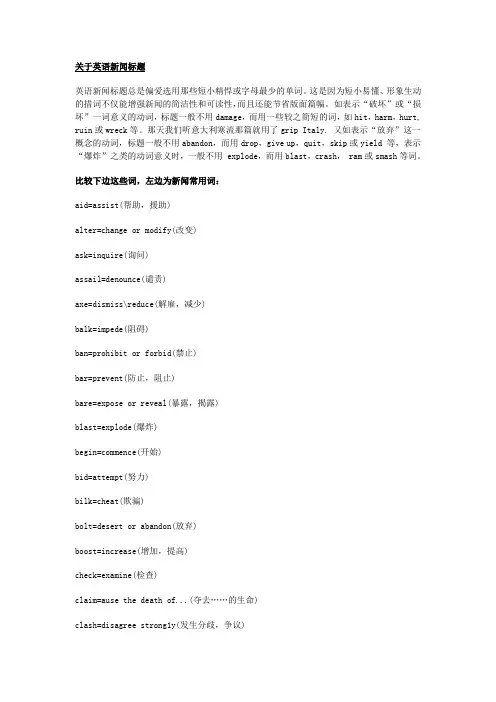
关于英语新闻标题英语新闻标题总是偏爱选用那些短小精悍或字母最少的单词。
这是因为短小易懂、形象生动的措词不仅能增强新闻的简洁性和可读性,而且还能节省版面篇幅。
如表示“破坏”或“损坏”一词意义的动词,标题一般不用damage,而用一些较之简短的词,如hit,harm,hurt, ruin或wreck等。
那天我们听意大利寒流那篇就用了grip Italy. 又如表示“放弃”这一概念的动词,标题一般不用abandon,而用drop,give up,quit,skip或yield 等,表示“爆炸”之类的动词意义时,一般不用 explode,而用blast,crash, ram或smash等词。
比较下边这些词,左边为新闻常用词:aid=assist(帮助,援助)alter=change or modify(改变)ask=inquire(询问)assail=denounce(谴责)axe=dismiss\reduce(解雇,减少)balk=impede(阻碍)ban=prohibit or forbid(禁止)bar=prevent(防止,阻止)bare=expose or reveal(暴露,揭露)blast=explode(爆炸)begin=commence(开始)bid=attempt(努力)bilk=cheat(欺骗)bolt=desert or abandon(放弃)boost=increase(增加,提高)check=examine(检查)claim=ause the death of...(夺去……的生命)clash=disagree strong1y(发生分歧,争议)curb=control or restrict(控制) dip=decIlne or decrease(下降) ease=lessen(减轻,缓和)end=terminate(结束,中止)flay=criticize(批评)flout=insult(侮辱)foil=prevent from(阻止,防止)grill = investigate(调查)gut=destroy(摧毁)head=direct(率领)hold=arrest(逮捕)laud=praise(赞扬)lop=diminish(下降,减少)map=work out(制订)mark=celebrate(庆祝)name=appoint\nominate(命名,提名) moot=discuss(讨论)mull=consider(考虑)nab=arrest(逮捕)nip=defeat(击败)ease=lessen(减轻,缓和)end=terminate(结束,中止)flay=criticize(批评)flout=insult(侮辱)foil=prevent from(阻止,防止)grill = investigate(调查)gut=destroy(摧毁)head=direct(率领)hold=arrest(逮捕)laud=praise(赞扬)lop=diminish(下降,减少)map=work out(制订)mark=celebrate(庆祝)name=appoint\nominate(命名,提名) moot=discuss(讨论)mull=consider(考虑)nab=arrest(逮捕)nip=defeat(击败)slay=murder(谋杀)soar=skyrocket(急剧上升)spur=encourage(激励,鞭策)swap=exchange(交流,交换)sway=influence(影响)trim=reduce(削减)vie=compete(竞争)vow=determine(决心,发誓)weigh=consider(考虑)。
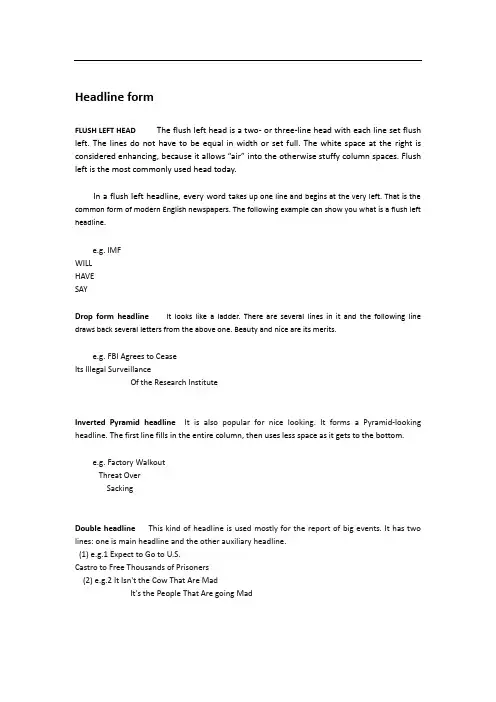
Headline formFLUSH LEFT HEAD The flush left head is a two- or three-line head with each line set flush left. The lines do not have to be equal in width or set full. The white space at the right is considered enhancing, because it allows “air” into the otherwise stuffy column spaces. Flush left is the most commonly used head today.In a flush left headline, every word ta kes up one line and begins at the very left. That is the common form of modern English newspapers. The following example can show you what is a flush left headline.e.g. IMFWILLHAVESAYDrop form headline It looks like a ladder. There are several lines in it and the following line draws back several letters from the above one. Beauty and nice are its merits.e.g. FBI Agrees to CeaseIts Illegal SurveillanceOf the Research InstituteInverted Pyramid headline It is also popular for nice looking. It forms a Pyramid-looking headline. The first line fills in the entire column, then uses less space as it gets to the bottom.e.g. Factory WalkoutThreat OverSackingDouble headline This kind of headline is used mostly for the report of big events. It has two lines: one is main headline and the other auxiliary headline.(1) e.g.1 Expect to Go to U.S.Castro to Free Thousands of Prisoners(2) e.g.2 It Isn't the Cow That Are MadIt's the People That Are going MadCentered Headline:this type of headline is centered above the column.Functions of HeadlinesSummarizing the story ; Arousing the reader’s interest ; Beautifying the newspaper page; Indicating how much importance each news item hasFeatures of headlinesGrammatical features Lexical features Rhetorical featuresstylistic features of English news articl e The stylistic feature issubdivided into three aspects -phonological features and graphological features, lexical feature and syntax feature, and semantic feature.。
![[英美报刊]英文新闻标题.pptx](https://uimg.taocdn.com/321939a1fab069dc502201d7.webp)
